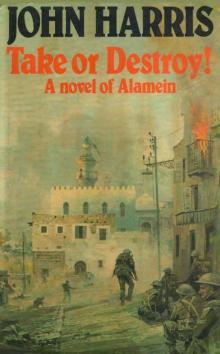- Home
- John Harris
Army of Shadows Page 3
Army of Shadows Read online
Page 3
Neither of them seemed to consider it odd that he should talk in this way. Though Neville was a pilot officer, Urquhart was the older and the more experienced and it seemed normal enough for him to jockey Neville along, chivvying him into using his wits.
‘Paris and the north, perhaps,’ Neville said. ‘Perhaps heading for the N74 to Nancy and the German frontier.’
They set off again. The village was further away than it had seemed and there appeared to be some activity going on in the valley. They could see lights moving, but not fast enough to belong to vehicles, and they decided to wait. After an hour or two the lights disappeared and they entered the village warily by the glow of the young moon. Whatever had been happening seemed to have stopped, and there were no lights at all now and no sign of life.
It was a small place set below the plateau, the sort of place which, cut off from the mainstream of events, hadn’t changed much in three hundred years. The names in the registers would be the names on the gravestones, their owners from families that had been born there for centuries, receiving their Confirmation and their first Communion there before marrying and finally dying and being buried there. , In the light of the moon the honey-coloured walls were touched with silver. The main street wound down out of the woods to where a stream crossed the road, then out again at the other side of the village. The houses were of worn stone and shabby almost to the point of neglect, with weather-beaten comers and timbers. Grass grew in tufts from clefts between the stones, and the roadway, crudely asphalted but like the rest of the village neglected after years of war, was silent under their feet from a thick trodden carpet of the droppings of farm animals. It had a country smell about it, of grass, decaying leaves and old wood, and Urquhart sniffed the air appreciatively.
‘Smells like home,’ he observed.
The roofs were higgledy-piggledy and overhung here and there with trees. Occasionally there were big double gateposts without gates that marked a larger house or a farm. Surrounded by crooked stones and gaunt family vaults, the church stood with the presbytery in a triangle of neglected grass and it was from round the presbytery door that there came the only light they could see.
There was a bar, dark now but with the usual fading advertisements for Dubonnet, St Raphaël and Byrrh; and two shops, both of which appeared to be practically empty, their windows filled with showcards rather than goods.
‘We’re not going to find anything here,’ Urquhart said.
Opposite the presbytery a disused water mill, its wheel stationary, loomed over the road and they crouched down by the stream under the hump-backed bridge beyond it to wash their faces. As they knelt they became aware of the sound of a car engine and in desperation looked round for shelter. ‘In here! ‘ Urquhart said.
Followed by Neville, he waded under the great wooden box containing the mill wheel. Behind it and above there was a compartment just big enough for them to crouch out of sight, and they had just huddled down in the darkness when lights appeared, making vivid slashes between the crooked planks of the wheel box as a lorry swung into the village and stopped.
Urquhart had picked up a little German in Africa and he scowled as he listened to the soldiers talking. They’re going to take the bloody place over,’ he whispered. ‘It’ll be crawling with ‘em by tomorrow.’
A scout car appeared and slid to a stop by the lorry with a squeal of brakes. There were four men inside and with the lifting moon they could see three of them were officers. While the driver waited, they crossed to the presbytery and banged on the door.
As it opened they began to speak in French and the men in the mill box could just make out what was said.
The Abbé Jean-Baptiste Pol?’
The voice that answered was low and subservient. ‘I am the curé.’
‘I command the 117th Pionierbataillon, 7th Sicherungs-regiment. We’re looking for the Chateau de Frager.’
3
The Chateau de Frager was situated in what had once been parkland at the southern edge of the village. It was badly neglected, with broken fences and fallen trees destroying the symmetry of the wind-breaks. The house itself was a square ugly building of grey stone, with high windows, cornices and ledges under a mansard roof. Like the estate, it was also neglected, and the gardens, hedges and yew walks were ragged with lack of attention.
When the Germans appeared, the Baronne de Frager was still at dinner and they were shown into the room by a frightened old manservant. The German colonel, a thickset, blond man with a paunch, bowed from the hips.
‘Colonel Klemens, madame,’ he said, stiffly polite. ‘117th Pionierbataillon, 7th Sicherungsregiment. These gentlemen are Major Klein-Wuttig and Captain Tarnera, of my staff. I’m taking over from Colonel Marx of the 9th. My guns are at Rolandpoint and my tanks, under Captain von Hoelcke, are at St Seigneur, where there’s more room. As Néry is central, headquarters will be here.’
With her companion, the Baronne had risen, an old, old woman like a dry stick, with hands that were knobbly with arthritis. She was small but her slimness made her seem taller, and her face, crossed with wrinkles like a spider’s web, was rigidly expressionless. Despite her great age, her hair was a bright red and was quite clearly dyed. For lack of anything better, she had been toying with an andouillette, one of the tripe sausages of the region, and, long since bored with it, was only too willing to push it aside and wait for the German to enlarge on what he’d said.
He had moved away, his eyes roving restlessly across the walls, the furniture, the painting over the fireplace. He seemed to have forgotten her, and one of the other officers, the handsome pale-faced youngster with cold blue eyes and reddish hair whom he had introduced as Major Klein-Wuttig, pointed at the floor between his feet. ‘We shall re-
quire the best rooms, old woman!’ he said. ‘You’ll be given two hours to move into the servants’ quarters.’
The German colonel brushed him aside. His manner had none of the other’s hectoring arrogance. ‘Who lives here, madame?’ he asked.
The old woman’s eyes flashed and she glanced at her companion, a withered old man as ancient as she was herself, dark-skinned, faintly Spanish-looking, with a beak of a nose that was as thin as a scimitar.
‘I live here’ she said. ‘With this gentleman; a manservant, Joseph; a girl, Euphrasie Doumic, who comes every day from the village to act as maid and do the laundry; a cook. Henriette Scholl; and a gardener, Gaston Psichari, who lives in one of the outbuildings. He is considered to be simple.’
Colonel Klemens nodded. There’s another one. I’m told. A young man. Your grandson, perhaps.’
The old woman’s face tautened. ‘My grandson lies near Sedan,’ she said. ‘You killed him in 1940, as you killed my husband and son in 1914.’
Klemens inclined his head. ‘I regret as much as you do the tragedies of war, madame. Then your great-grandson, perhaps. Where is he?’
The old woman sniffed. ‘I’m sure he won’t be breaking the curfew,’ she said. ‘He’s probably in bed with a girl somewhere.’
Klemens turned away, staring at the walls again. The Baronne stared after him. She was dressed in what appeared to be a shabby kaftan, beneath which was what had once been a fashionable evening dress, though it now looked faded and as if it badly needed replacing.
This is my home,’ she pointed out acidly. ‘It’s been declared a museum. Under Occupation law, museums cannot be occupied.’
Klein-Wuttig turned stiffly. ‘We know that old chestnut,’ he said. The minute you hear us coming, you grab every bit of rubbish you’ve got and stuff it into the place and say it’s a restricted building. You won’t get away with it here.’
The colonel turned from examining the pictures. ‘Madame, I know perfectly well that my predecessor, Colonel Man, occupied this place. I intend to also. We shall use the mairie for offices. I shall need to see the maire.’
The old woman’s head jerked up. ‘I am the maire,’ she said. The de Fragers have been maries of Néry-le-Cha
teau since before the Revolution. My great-grandson will take over from me when he is old enough and - ah- has acquired some sense of responsibility.’
The German turned to the old man alongside her. He was as odd a figure as she was, with his hollow cheeks and sagging clothes. He had a monocle on a broad black ribbon jammed in his eye and wore a toupee that looked as artificial as the Baronne’s hair.
‘Name ?’ he barked.
The old man jumped. ‘Balmaceda, monsieur. Edgar Balmaceda.’
‘Relation?’
The Baronne’s head lifted again. ‘Monsieur Balmaceda is an old friend. He’s an artist.’
‘Not a very good one, I’m afraid,’ Balmaceda said gently. ‘I know about art but I have little skill.’
The German was staring round him. There were a few small artifacts about the room and he picked up a pottery figure and studied it. ‘I’m interested in art myself,’ he pointed out. ‘I shall enjoy being surrounded by such things as I know you possess.’
‘Then I hope,’ the Baronne snapped, ‘that you’ll manage to keep warmer while you’re doing it than I have. The central heating’s always been inefficient and now there’s no coke and no coal because you Germans have taken it all. My fireplace has not seen a fire since January, 1942, and I’m driven to wearing my late husband’s sheepskin coat which he wore as a cavalryman in the High Atlas years ago in a better war than this one.’
Klemens’ expression remained unaltered. ‘The valley’s surrounded by trees,’ he pointed out. There’s plenty of wood.’
‘There’s less than there was because you’re taking that, too, to pay off the costs of the Occupation - as you’ve taken the church bells, the gates and the railings of every house in the village that possessed them - and work has been forbidden in the forest since your last brush with the Maquis.’
Klemens was obviously not interested in the village’s woes. His eye was held by the picture over the empty fireplace. It was surrounded by fading wallpaper, as though what had originally hung there had been much bigger. It showed a pond with weeping willows and two or three girls in classical poses staring at the water. ‘Would that be a Corot?’ he asked.
The Baronne’s mouth, wrinkled as if it were stitched, stretched in a sarcastic smile. ‘It would not,’ she said. ‘Some insignificant artist. I don’t even know the name.’
‘You have other paintings?’
‘I’ve told you. This place is a museum.’
‘What does it contain ?’
‘Nothing worthy of your attention. This is an out-of-the-way place.’
Klemens frowned. He seemed to be growing angry. ‘We shall see,’ he said. ‘We shall see.’
By the following morning there were three lorries in the street and German soldiers were everywhere - several of them sitting on the wall of the hump-backed bridge, smoking, so that the two men in the box of the mill wheel could smell the fragrance of their cigars and cigarettes. Alongside the bridge the ground sloped down from the road to the stream where they had knelt to wash their faces the night before, and the Germans had torn down a fence and built a fire there to make coffee.
The first villager to appear was an old man in a beret, blue smock and trousers, his feet in the banana-yellow rubber boots all French farm-workers seemed to wear. He was carrying a fork and a sickle and he edged along the wall past the Germans as though afraid they might stop him. Doors began to open and a few children appeared, wearing black school pinafores over their clothes, to stand staring at the Germans as they gnawed at pieces of dark-coloured bread. One of the Germans offered chocolate but the children shook their heads and edged away.
By this time, Urquhart was hanging on to his sanity only with difficulty. His foot seemed to be breaking out of his boot with the pain of his injury. His whole leg felt numbed by it, and it seemed to be threading its way insidiously up into his body so that he couldn’t think and hardly dared to move.
The previous day’s sun had gone and the morning was chilly, with a cold wind blowing through the ancient wood of the mill box so that, in their wet clothes, the men inside were wretched and cramped with not moving. During the late afternoon, a German scout car appeared and they could see a German sergeant giving orders. Eventually the lorries disappeared, grinding slowly up the street, and as it began to grow dusk, Urquhart glanced up and down the empty village. Seeing no one, he cautiously lowered his injured leg and began to climb down. It was difficult and painful and he had to take a long time. A door clicked as he was halfway out and he struggled hurriedly back to shelter. The priest had emerged from the presbytery and in the last of the light they saw he was a burly man with a vast paunch, grey hair and thick spectacles. He was smoking a curved pipe and holding a glass of red wine. Walking across the road towards the mill pond, he stared down into the water as though looking for fish. He appeared to be singing to himself.
‘Au bois, mesdames,
Au joli petit bois.
Qu’est-ce qui s’y promènera?’
He paused; then, moving along the stream nearer the mill box, still staring into the water, he began to sing again.
‘Attention, messieurs.
Attention, s’il vous plait.
II y a one sentinell-e
Au-delà du petit pont.’
The bugger’s warning us,’ Urquhart breathed.
‘He can’t be.’
‘He says there’s a sentry at the other side of the bloody bridge!’
Neville was inclined to disagree, even to disbelieve Urquhart’s claim to be able to understand French. With the youthful arrogance of the university graduate, nothing, he felt, that had been picked up in a village school and added to during nine months’ campaigning in the north could measure up to his own capabilities. ‘It’s part of the song,’ he said. ‘It’s obviously part of the song.’
Urquhart turned on him furiously, his anger increased by the nagging pain in his foot. ‘For Christ’s sake,’ he snapped, ‘I know what it means! He was telling us to be careful!’
The priest had turned back to the presbytery now and they heard him sing again:
‘Attention, messieurs!
II arriv-e tout de suit-e.
Attention! Attention!
Attention un moment d’plus!’
Finishing his wine, he spat into the stream and turned in the doorway, smiling, as a German, his rule slung, appeared within the field of vision of the men in the mill box.
‘By Christ, he was warning us I’ Neville said.
Immediately the cold feeling of being alone was replaced by a warm one of being among friends. Somewhere, in this outlandish little village, not very pretty, obviously not prosperous, there was someone who was prepared to help them. It had seemed that in the whole wide land of France there had been no one, but now, suddenly, Urquhart felt sure they were surrounded by allies.
It was just growing dark when the priest reappeared. This time he was carrying a string bag containing a bottle and half a loaf of bread. On his head he wore a dusty black shovel hat, and his old grey boots - like those of a farm-labourer - splashed in the puddles as he trudged out of sight, conducting a conversation as he went with the invisible sentry.
Hungry, cold and cramped, they had lapsed into a shivering half-sleep when a sharp click above their heads made them jump. In his surprise, Neville almost fell off his perch. A faint, fading torch shone on their faces, and above them they saw a trap-door. Because it hadn’t been opened for years, they hadn’t noticed it in the shadowy interior of the mill box, but it had obviously been placed there by the mill owner in the days when the mill had worked, to repair and oil his wheel.
‘Messieurs!’ A low hoarse voice whispered to them. ‘Suivez-moi! Par ici!’
Neville glanced at Urquhart and the voice came again. Urgently.
‘Vite! Vite!’
Coming to life, Neville scrambled to his knees and, reaching up, grasped the edge of the trap-door. Stiff with twenty-four hours of crouching, he almost fell, but a strong
hand came down and, grabbing his clothing, dragged him through so that he sprawled on a worn wooden floor thick with dust and old flour. Urquhart followed him and, as the trap-door thudded softly to, in the light of the torch they could see the great stones of the mill and a pile of empty grey sacks.
‘Ça va, mon vieux?’ The shadowy figure in front of them spoke in a hoarse corncrake voice. lVous parlez français un peu?’
‘Oui’
‘Par les deux?’
‘Si. Tous les deux.’
‘Oh, mon dieu!’ The Frenchman sounded amazed. ‘Not just one Englishman who speaks French, but two! Quel sang-froid!’ He grinned. ‘Father Pol told us you were here. He saw you from the presbytery.’ He tapped his chest. ‘Me, I am Hyacinthe Reinach. Sometimes they call me the Alsatian or Boche d’Est because I came here originally from near Strasbourg. My trade is wood, and this is Néry-le-Chlteau. During the Revolution they called it Néry-le-Fond, but we don’t like change much round here and after it was over they changed it back again. You are from the aeroplane that crashed near St Seigneur-du-Ciel?’
‘It sounds like it.’
The Frenchman looked puzzled. ‘But, messieurs, there were seven bodies in it. The Germans found them all. It was a Lancaster, and they carry only seven.’
‘This one carried nine.’
The Frenchman grinned and spread his hands in a gesture of pleasure. Then you are safe, my friend. They assumed there were no more.’
They followed the Frenchman down a set of wooden steps to the yard and, entering a building smelling of horse-dung, climbed through a sliding wooden window which had lost its slats. Beyond, they found themselves in another yard which appeared to belong to a forge. The Frenchman said nodding and opened a gate which led into a narrow lane fringed with grass. Still without speaking, Urquhart grinding his teeth at the pain in his foot, they moved along a wall to a point where the stones had collapsed, leaving a narrow gap. At the other side was a high ugly building surrounded by stables.
‘Chateau de Frager,’ Reinach said.

 China Seas
China Seas The Mercenaries
The Mercenaries Road To The Coast
Road To The Coast The Thirty Days War
The Thirty Days War The Old Trade of Killing
The Old Trade of Killing Ride Out The Storm
Ride Out The Storm Corporal Cotton's Little War
Corporal Cotton's Little War Fox from His Lair
Fox from His Lair Paint The Rainbow
Paint The Rainbow Flawed Banner
Flawed Banner Covenant with Death
Covenant with Death So Far From God
So Far From God The Sea Shall Not Have Them
The Sea Shall Not Have Them The Cross of Lazzaro
The Cross of Lazzaro Smiling Willie and the Tiger
Smiling Willie and the Tiger Harkaway's Sixth Column
Harkaway's Sixth Column The Sleeping Mountain
The Sleeping Mountain The Claws of Mercy
The Claws of Mercy North Strike
North Strike Picture of Defeat
Picture of Defeat Army of Shadows
Army of Shadows Right of Reply
Right of Reply Getaway
Getaway The Lonely Voyage
The Lonely Voyage Take or Destroy!
Take or Destroy! The Backpacker
The Backpacker A Funny Place to Hold a War
A Funny Place to Hold a War Swordpoint (2011)
Swordpoint (2011) A Kind of Courage
A Kind of Courage